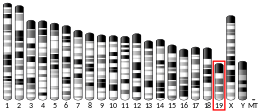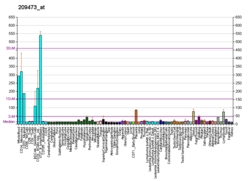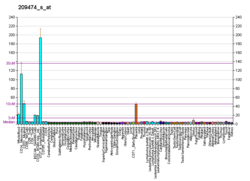ENTPD1
| ENTPD1 | |||||||||||||||||||||||||||||||||||||||||||||||||||
|---|---|---|---|---|---|---|---|---|---|---|---|---|---|---|---|---|---|---|---|---|---|---|---|---|---|---|---|---|---|---|---|---|---|---|---|---|---|---|---|---|---|---|---|---|---|---|---|---|---|---|---|
| Identifiers | |||||||||||||||||||||||||||||||||||||||||||||||||||
| Aliases | ENTPD1, ATPDase, CD39, NTPDase-1, SPG64, ectonucleoside triphosphate diphosphohydrolase 1 | ||||||||||||||||||||||||||||||||||||||||||||||||||
| External IDs | OMIM: 601752; MGI: 102805; HomoloGene: 20423; GeneCards: ENTPD1; OMA:ENTPD1 - orthologs | ||||||||||||||||||||||||||||||||||||||||||||||||||
| |||||||||||||||||||||||||||||||||||||||||||||||||||
| |||||||||||||||||||||||||||||||||||||||||||||||||||
| |||||||||||||||||||||||||||||||||||||||||||||||||||
| |||||||||||||||||||||||||||||||||||||||||||||||||||
| |||||||||||||||||||||||||||||||||||||||||||||||||||
| Wikidata | |||||||||||||||||||||||||||||||||||||||||||||||||||
| |||||||||||||||||||||||||||||||||||||||||||||||||||
Ectonucleoside triphosphate diphosphohydrolase-1 (gene: ENTPD1; protein: NTPDase1) also known as CD39 (Cluster of Differentiation 39), is a typical cell surface enzyme with a catalytic site on the extracellular face.[5][6][7]
Function
[edit]NTPDase1 is an ectonucleotidase that catalyse the hydrolysis of γ- and β-phosphate residues of triphospho- and diphosphonucleosides to the monophosphonucleoside derivative.[8][9] NTPDase1 hydrolyzes P2 receptor ligands, namely ATP, ADP, UTP and UDP with similar efficacy.[10] NTPDase1 can therefore affect P2 receptor activation and functions.[11]
Clinical significance
[edit]ATP causes a pro-inflammatory environment, whereas degradation of ATP into adenosine by the CD39/CD73 pathway leads to an anti-inflammatory environment.[12] CD39 converts ATP (or ADP) to adenosine monophosphate (AMP), which is converted into adenosine by CD73.[12][13] A substantial portion of the immune suppressive and anti-inflammatory activity of regulatory T cells (Tregs) is due to the adenosine produced by the CD39/CD73 pathway, insofar as Tregs express CD39 and CD73.[12] [13]
Adenosine produced by the CD39/CD73 pathway can protect against ischemia-reperfusion injury.[12] On the other hand, high expression and activity of CD39 and CD73 on cancer cells can prevent the immune system from inhibiting the progression of cancer.[12]
Biallelic pathogenic variant in ENTPD1 causes autosomal recessive spastic paraplegia 64 (SPG64).[14][15] SPG64 is a complex hereditary spastic paraplegia characterized by childhood onset progressive spastic paraparesis, delayed developmental milestones, intellectual disability, dysarthria, and white matter abnormalities.
See also
[edit]References
[edit]- ^ a b c GRCh38: Ensembl release 89: ENSG00000138185 – Ensembl, May 2017
- ^ a b c GRCm38: Ensembl release 89: ENSMUSG00000048120 – Ensembl, May 2017
- ^ "Human PubMed Reference:". National Center for Biotechnology Information, U.S. National Library of Medicine.
- ^ "Mouse PubMed Reference:". National Center for Biotechnology Information, U.S. National Library of Medicine.
- ^ "Entrez Gene: ENTPD1 Ectonucleoside triphosphate diphosphohydrolase 1".
- ^ Sévigny J, Levesque FP, Grondin G, Beaudoin AR (Feb 1997). "Purification of the blood vessel ATP diphosphohydrolase, identification and localisation by immunological techniques". Biochimica et Biophysica Acta (BBA) - General Subjects. 1334 (1): 73–88. doi:10.1016/s0304-4165(96)00079-7. PMID 9042368.
- ^ Kaczmarek E, Koziak K, Sévigny J, Siegel JB, Anrather J, Beaudoin AR, Bach FH, Robson SC (Dec 1996). "Identification and characterization of CD39/vascular ATP diphosphohydrolase". The Journal of Biological Chemistry. 271 (51): 33116–22. doi:10.1074/jbc.271.51.33116. PMID 8955160.
- ^ Robson SC, Sévigny J, Zimmermann H (Jun 2006). "The E-NTPDase family of ectonucleotidases: Structure function relationships and pathophysiological significance". Purinergic Signalling. 2 (2): 409–30. doi:10.1007/s11302-006-9003-5. PMC 2254478. PMID 18404480.
- ^ Yegutkin GG (May 2008). "Nucleotide- and nucleoside-converting ectoenzymes: Important modulators of purinergic signalling cascade". Biochimica et Biophysica Acta (BBA) - Molecular Cell Research. 1783 (5): 673–94. doi:10.1016/j.bbamcr.2008.01.024. PMID 18302942.
- ^ Kukulski F, Lévesque SA, Lavoie EG, Lecka J, Bigonnesse F, Knowles AF, Robson SC, Kirley TL, Sévigny J (Jun 2005). "Comparative hydrolysis of P2 receptor agonists by NTPDases 1, 2, 3 and 8". Purinergic Signalling. 1 (2): 193–204. doi:10.1007/s11302-005-6217-x. PMC 2096530. PMID 18404504.
- ^ Kukulski F, Lévesque SA, Sévigny J (2011-01-01). "Impact of ectoenzymes on p2 and p1 receptor signaling". Pharmacology of Purine and Pyrimidine Receptors. Advances in Pharmacology. Vol. 61. pp. 263–99. doi:10.1016/B978-0-12-385526-8.00009-6. ISBN 978-0-12-385526-8. PMID 21586362.
- ^ a b c d e Antonioli L, Pacher P, Vizi ES, Haskó G (2013). "CD39 and CD73 in immunity and inflammation". Trends in Molecular Medicine. 19 (6): 355–367. doi:10.1016/j.molmed.2013.03.005. PMC 3674206. PMID 23601906.
- ^ a b Sepúlveda C, Palomo I, Fuentes E (2016). "Role of adenosine A2b receptor overexpression in tumor progression". Life Sciences. 166: 92–99. doi:10.1016/j.lfs.2016.10.008. PMID 27729268.
- ^ Novarino G, Fenstermaker AG, Zaki MS, et al. (Jan 2014). "Exome sequencing links corticospinal motor neuron disease to common neurodegenerative disorders". Science. 343 (6170): 506–511. Bibcode:2014Sci...343..506N. doi:10.1126/science.1247363. PMC 4157572. PMID 24482476.
- ^ Calame DG, Herman I, Maroofian R, et al. (Aug 2022). "Biallelic Variants in the Ectonucleotidase ENTPD1 Cause a Complex Neurodevelopmental Disorder with Intellectual Disability, Distinct White Matter Abnormalities, and Spastic Paraplegia". Ann Neurol. 92 (2): 304–321. doi:10.1002/ana.26381. hdl:1887/3564840. PMC 10054521. PMID 35471564.
Further reading
[edit]- Maliszewski CR, Delespesse GJ, Schoenborn MA, Armitage RJ, Fanslow WC, Nakajima T, Baker E, Sutherland GR, Poindexter K, Birks C (Oct 1994). "The CD39 lymphoid cell activation antigen. Molecular cloning and structural characterization". Journal of Immunology. 153 (8): 3574–83. doi:10.4049/jimmunol.153.8.3574. PMID 7930580. S2CID 34664153.
- Christoforidis S, Papamarcaki T, Galaris D, Kellner R, Tsolas O (Nov 1995). "Purification and properties of human placental ATP diphosphohydrolase". European Journal of Biochemistry. 234 (1): 66–74. doi:10.1111/j.1432-1033.1995.066_c.x. PMID 8529670.
- Wang TF, Guidotti G (Apr 1996). "CD39 is an ecto-(Ca2+,Mg2+)-apyrase". The Journal of Biological Chemistry. 271 (17): 9898–901. doi:10.1074/jbc.271.17.9898. PMID 8626624.
- Kaczmarek E, Koziak K, Sévigny J, Siegel JB, Anrather J, Beaudoin AR, Bach FH, Robson SC (Dec 1996). "Identification and characterization of CD39/vascular ATP diphosphohydrolase". The Journal of Biological Chemistry. 271 (51): 33116–22. doi:10.1074/jbc.271.51.33116. PMID 8955160.
- Robson SC, Kaczmarek E, Siegel JB, Candinas D, Koziak K, Millan M, Hancock WW, Bach FH (Jan 1997). "Loss of ATP diphosphohydrolase activity with endothelial cell activation". The Journal of Experimental Medicine. 185 (1): 153–63. doi:10.1084/jem.185.1.153. PMC 2196106. PMID 8996251.
- Gray IC, Fallowfield J, Ford S, Nobile C, Volpi EV, Spurr NK (Jul 1997). "An integrated physical and genetic map spanning chromosome band 10q24". Genomics. 43 (1): 85–8. doi:10.1006/geno.1997.4809. PMID 9226376.
- Makita K, Shimoyama T, Sakurai Y, Yagi H, Matsumoto M, Narita N, Sakamoto Y, Saito S, Ikeda Y, Suzuki M, Titani K, Fujimura Y (Oct 1998). "Placental ecto-ATP diphosphohydrolase: its structural feature distinct from CD39, localization and inhibition on shear-induced platelet aggregation". International Journal of Hematology. 68 (3): 297–310. doi:10.1016/S0925-5710(98)00080-2. PMID 9846014.
- Matsumoto M, Sakurai Y, Kokubo T, Yagi H, Makita K, Matsui T, Titani K, Fujimura Y, Narita N (Jun 1999). "The cDNA cloning of human placental ecto-ATP diphosphohydrolases I and II". FEBS Letters. 453 (3): 335–40. doi:10.1016/S0014-5793(99)00751-6. PMID 10405171. S2CID 35474833.
- Kittel A, Kaczmarek E, Sevigny J, Lengyel K, Csizmadia E, Robson SC (Sep 1999). "CD39 as a caveolar-associated ectonucleotidase". Biochemical and Biophysical Research Communications. 262 (3): 596–9. doi:10.1006/bbrc.1999.1254. PMID 10471369.
- Koziak K, Kaczmarek E, Kittel A, Sévigny J, Blusztajn JK, Schulte Am Esch J, Imai M, Guckelberger O, Goepfert C, Qawi I, Robson SC (Jan 2000). "Palmitoylation targets CD39/endothelial ATP diphosphohydrolase to caveolae". The Journal of Biological Chemistry. 275 (3): 2057–62. doi:10.1074/jbc.275.3.2057. PMID 10636909.
- Dias Neto E, Correa RG, Verjovski-Almeida S, Briones MR, Nagai MA, da Silva W, Zago MA, Bordin S, Costa FF, Goldman GH, Carvalho AF, Matsukuma A, Baia GS, Simpson DH, Brunstein A, de Oliveira PS, Bucher P, Jongeneel CV, O'Hare MJ, Soares F, Brentani RR, Reis LF, de Souza SJ, Simpson AJ (Mar 2000). "Shotgun sequencing of the human transcriptome with ORF expressed sequence tags". Proceedings of the National Academy of Sciences of the United States of America. 97 (7): 3491–6. Bibcode:2000PNAS...97.3491D. doi:10.1073/pnas.97.7.3491. PMC 16267. PMID 10737800.
- Goepfert C, Imai M, Brouard S, Csizmadia E, Kaczmarek E, Robson SC (Jul 2000). "CD39 modulates endothelial cell activation and apoptosis". Molecular Medicine. 6 (7): 591–603. doi:10.1007/BF03401797. PMC 1949966. PMID 10997340.
- Kittel A, Garrido M, Varga G (Apr 2002). "Localization of NTPDase1/CD39 in normal and transformed human pancreas". The Journal of Histochemistry and Cytochemistry. 50 (4): 549–56. doi:10.1177/002215540205000412. PMID 11897808.
- Kaneider NC, Egger P, Dunzendorfer S, Noris P, Balduini CL, Gritti D, Ricevuti G, Wiedermann CJ (Jun 2002). "Reversal of thrombin-induced deactivation of CD39/ATPDase in endothelial cells by HMG-CoA reductase inhibition: effects on Rho-GTPase and adenosine nucleotide metabolism". Arteriosclerosis, Thrombosis, and Vascular Biology. 22 (6): 894–900. doi:10.1161/01.ATV.0000018305.95943.F7. PMID 12067895.
- Drosopoulos JH (Oct 2002). "Roles of Asp54 and Asp213 in Ca2+ utilization by soluble human CD39/ecto-nucleotidase". Archives of Biochemistry and Biophysics. 406 (1): 85–95. doi:10.1016/S0003-9861(02)00414-9. PMID 12234494.
- Krötz F, Sohn HY, Keller M, Gloe T, Bolz SS, Becker BF, Pohl U (Dec 2002). "Depolarization of endothelial cells enhances platelet aggregation through oxidative inactivation of endothelial NTPDase". Arteriosclerosis, Thrombosis, and Vascular Biology. 22 (12): 2003–9. doi:10.1161/01.ATV.0000043454.08172.51. PMID 12482826.
- Rossatto ER, da Silva LB, Pereira GS, Bonan CD, Battastini AM, Ribeiro JP, Sarkis JJ (Feb 2003). "ATP diphosphohydrolase in human platelets from patients with coronary arteries heart disease". Platelets. 14 (1): 47–52. doi:10.1080/0953710021000062923. PMID 12623446. S2CID 24657425.
- Sørensen CE, Amstrup J, Rasmussen HN, Ankorina-Stark I, Novak I (Sep 2003). "Rat pancreas secretes particulate ecto-nucleotidase CD39". The Journal of Physiology. 551 (Pt 3): 881–92. doi:10.1113/jphysiol.2003.049411. PMC 2343304. PMID 12832497.
- Sévigny J, Sundberg C, Braun N, Guckelberger O, Csizmadia E, Qawi I, Imai M, Zimmermann H, Robson SC (Apr 2002). "Differential catalytic properties and vascular topography of murine nucleoside triphosphate diphosphohydrolase 1 (NTPDase1) and NTPDase2 have implications for thromboregulation". Blood. 99 (8): 2801–9. doi:10.1182/blood.v99.8.2801. PMID 11929769.
- Novarino G, Fenstermaker AG, Zaki MS, et al. (Jan 2014). "Exome sequencing links corticospinal motor neuron disease to common neurodegenerative disorders". Science. 343 (6170): 506–511. Bibcode:2014Sci...343..506N. doi:10.1126/science.1247363. PMC 4157572. PMID 24482476.
- Calame DG, Herman I, Maroofian R, et al. (Aug 2022). "Biallelic Variants in the Ectonucleotidase ENTPD1 Cause a Complex Neurodevelopmental Disorder with Intellectual Disability, Distinct White Matter Abnormalities, and Spastic Paraplegia". Ann Neurol. 92 (2): 304–321. doi:10.1002/ana.26381. hdl:1887/3564840. PMC 10054521. PMID 35471564.
External links
[edit]- ENTPD1+protein,+human at the U.S. National Library of Medicine Medical Subject Headings (MeSH)


 French
French Deutsch
Deutsch





